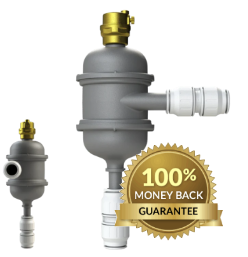Brits up and down the country are saying goodbye to summer, and preparing for the incoming Autumn weather.
With temperatures set to drop over the coming weeks and months, many will be contemplating how to save money on their energy bills prior to the big switch-on, which is officially marked on October 10th.
Plus, with the recent news that, despite the energy price cap, one in three households will still be paying more on their energy bills, it seems that households may still be grappling with the decision of heating and eating this winter.
Home heating expert, Charles Ross from Airgon Technologies, outlines some simple things to do now in order to save money on energy bills when the cold spell hits.
Lower your Boiler Flow Temperature
The flow temperature is the temperature your boiler heats the water to before sending it off to your radiators.
Charles says: “When first installed, many gas boilers are initially set up to operate at what is called 80/60 flow and return temperatures. This means the boiler heats up the water to 80°C.
“These initial settings could actually limit the boiler condensing capabilities, so it’s always worth turning the flow temperature down to 60°C for an average household, or 50°C for modern,well-insulated properties.”
Lower temperatures will maximise the condensation in your boiler, resulting in efficient heating and lower energy bills.
Most boilers have two dials; one for radiators and one for water, so to amend the flow temperature simply turn down the radiator dial.
Though tempting, never turn the boiler flow temperature below 50°C as anything below this may increase the risk of bacteria and germs, such as Legionnaires.
Don’t Turn Off Radiators!
Charles says: “Whilst generally we think switching items off when not in use saves energy (such as plug sockets, and appliances), turning off your radiators completely is actually less energy efficient.
“Turning radiators off completely is less energy efficient as it means the boiler has to work harder to maintain the temperature of a room than if kept at a low setting. Turning them off can also cause numerous issues with mould and dampness, especially if drying clothes inside.”
Instead, it’s recommended to keep the radiators on - but on a low setting.
The minimum recommended temperature indoors is 18°C, which is usually number 2 or 3 on your radiator valves, and it’s important to remember that people with pre-existing medical conditions, children under the age of 5 and vulnerable people are more susceptible to the cold, so this may need to be adjusted for them.
Check for Cold Spots
Cold spots occur when air gets trapped in radiators or due to a build up of sludge which both prevent the flow of water transferring heating into the room.
Over time, more and more air and sludge accumulates in the radiators meaning that the boiler has to work harder.
Charles says: “The radiator will then need to be bled, or at worst, the entire heating system may need a power flush, which can cost anywhere from £350 - £800, on average.
It’s better to identify any cold spots during the warmer months, when households aren’t as dependent on their heating and radiators, as opposed to in winter.”
For those that aren’t confident bleeding radiators themselves, it can cost up to £100 for a call-out, so instead Charles suggests installing a device such as Airgon, which stops corrosion inside the radiators, and ensures that radiators no longer need to be bled. Households, when considering a home heating device, can also find out their potential energy savings by using Airgon’s energy calculator.
Installing a device such as this saves households up to £650 a year, increases efficiency by as much as 30%, prolongs the life of boilers, even old ones over eight years old, and reduces the chance of costly plumbing emergencies or call-outs.
For those looking to tackle their energy costs prior to winter, Airgon is available to buy now from www.airgon.co.uk at a one-off cost of £249 or spread payment options.
Airgon also offers a 100% money-back guarantee; if the device doesn’t lower household heating bills by a minimum of 10%, the company will give shoppers their money back, guaranteed.




